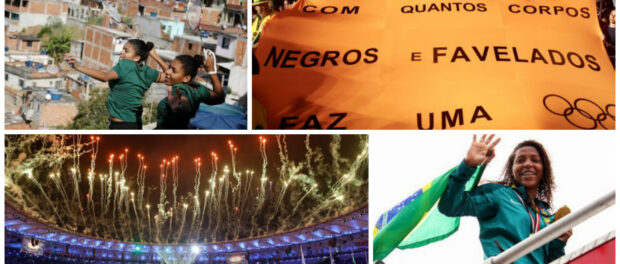
August 2016: the month the city of Rio de Janeiro had prepared for for seven tumultuous years. To help our readers digest the major news and themes of the month, we’ve summarized the stories we published here on RioOnWatch along with a few other must-reads in the media on favelas. Access past monthly summaries here and full digests here.
The 2016 Rio Olympics are over but the effects of seven years of rapid urban transformations remain. The Games leave behind questionable legacies from projects like the BRT lines to the Port revitalization project, inspired by Barcelona’s redevelopment ahead of 1992. Economist Andrew Zimbalist argues the Olympics are unlikely to bring about the economic benefits touted by organizers and the elite members of the IOC. As CatComm’s Theresa Williamson argued in openDemocracy, the real positive legacies of the Games were not the expected ones.
As the Olympics unfolded, a court ordered the removal of the entire community of Horto within 90 days. Residents of Vila Autódromo celebrated their victory to remain with an occupation and protest in front of the Olympic Park, but those who were excluded by the City continue to struggle.
Thousands of families moved into public housing in the West Zone are now under the control of militia. Members of the Aldeia Maracanã indigenous community are inappropriately housed in restrictive public housing, while the site they were evicted from remains empty. Community activists who put their lives at risk were honored in the Front Line Defenders press conference.
As documented on social media by community groups like Maré Vive, police killings continued during the Games. The violence was a key focus of activists’ “Hunger to Live” protest and the “Exclusion Games” protest on the opening day of the Games. The Olympic torch relay attracted both protest and pride in the Baixada, while residents of Sepetiba in the West Zone demanded attention for their own polluted bay. Despite the heavy issues at stake, activists have often used humor to critique the Olympics.
Local journalists organized the first Community Communication Congress to discuss how local media can be most impactful. Favela journalists also participated in CatComm’s #StopFavelaStigma campaign, with two of the articles published on RioOnWatch that day written by community contributors Daiene Mendes and Diana Anastácia. We also published an article showing how Asa Branca scores higher than the Olympic Athletes’ Village on the LEED sustainability scale, and materials that highlighed favela qualities like this fantastic favela explainer video from Vox.
In general, the Olympics offered a unique occasion to challenge the stigmas around favelas, from the passinho featured in the Opening Ceremony to the opportunities for favela tourism to influence tourists’ perceptions positively. That said, increased tourism to Vidigal’s Dois Irmãos trail has had some negative consequences for the community.
City of God resident Rafaela Silva won Brazil’s first gold medal and her victory parade brought joy to her community. Several other Olympic athletes from Rio favelas also brought pride to their neighborhoods. One trained at the badminton school that was one of the five innovative community projects featured in the Reimagine Rio film series. Another of the five films explores the Afro-Brazilian dance tradition of jongo, in Madureira.
We spotlighted several other creative community projects this month, including work to paint murals on a wall preserving Afro-Brazilian history near the Olympic Boulevard, an event in Providência that brought together artists from the favela and the formal city, and the NGO Onda Verde, in Nova Iguaçu, which does exemplary work to keep local water supplies clean. In Santa Teresa, residents took repairs for the neglected bonde track into their own hands, while the Neighborhood Association president of Pereira da Silva discussed his vision for his community.
After we weighed in on how journalists could productively cover Rio’s Olympics in POLITICO, some international media nonetheless focused on the Games themselves at the expense of issues facing the city, though ultimately there was a substantial amount of thoughtful, critical reflection in the mainstream media. We published our take on the best and worst reporting during the Olympics, and supported another Olympics media analysis piece in the Columbia Journalism Review. This piece and one other we supported were cited in a Columbia Journalism Review analysis of best and worst reporting for August.
Finally, we were thrilled to have supported a destigmatizing favela message reaching tens of millions through NBC‘s Today Show on August 12, one of a record number of articles and videos we supported this month. And we were absolutely delighted that our tireless work over these past six years building RioOnWatch and tackling favela stigma was recognized in an article in The Development Set, titled, “The tiny NGO that changed reporting on Rio’s favelas during the Olympics.”
Look out for our next summary of articles from September, as RioOnWatch begins an exciting transition towards a more solutions-focused platform. For more information and links to favela news from the month, see our full Favela Digest for August 2016 here. You can subscribe to receive the Favela Digest straight to your inbox each month here.
